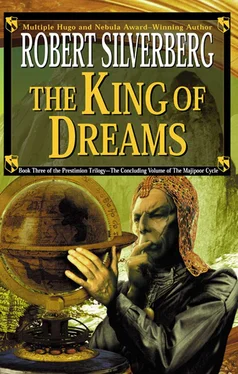He denied none of that. But his older self was less easily awed by such things. A Coronal, he knew by now, is only a man who wears a green robe trimmed with ermine, and on certain formal occasions is permitted to don a crown and occupy a throne. He is still a man, for all that. Someone must be Coronal, and, through an unlikely chain of accidents, the choice had fallen upon him. That chain had passed through Prestimion’s long-ago visit to Normork and Sithelle’s death; through his own unhappy hunting trip in the Khyntor Marches and the impulsive journey of penance to Suvrael that had followed it, leading to his discovery of the Barjazids and their mind-controlling helmets; and through the war against Dantirya Sambail and Akbalik’s death, which had removed the expected heir to the crown. Thus it had come down to him. So be it, then. He will be Coronal. He will nevertheless remain a man, who must eat and sleep and void his bowels and one day die. But for the time being he will be Lord Dekkeret of Lord Dekkeret’s Castle, and he will build the Dekkeret Chapel over there, and in Normork he will, as he had told Dinitak Barjazid what was beginning to seem like a hundred years ago, eventually build the Dekkeret Gate, and perhaps also—
“My lord?”
The voice, breaking into his ruminations this way, startled him more than a little.
Nor did Dekkeret believe at first that he was the one being addressed. He was still not used to that title, “my lord.” He looked around, thinking to find Prestimion somewhere in the vicinity; but then he realized that the words had been intended for him. The speaker was the Su-Suheris Maundigand-Klimd, High Magus to the court of Prestimion.
“I know I intrude on your privacy, my lord. I ask your forgiveness for that.”
“You do nothing without good reason, Maundigand-Klimd. Forgiveness is hardly necessary.”
“I thank you, sir. As it happens, I have something of importance to bring to your attention. May we confer in some place less public than this?”
Dekkeret signaled the two-headed being to lead the way.
He had never quite understood how Prestimion, a man of the most dogged and ingrained skepticism when it came to all matters mystical and occult, happened to maintain a magus among his circle of intimates. Confalume had been a man much given over to sorcery, yes, and Dekkeret understood that Prankipin before him had had the same irrational leanings; but Prestimion had always seemed to him to be someone who relied on the evidence of his reason and his senses, rather than on the conjurings and prognostications of seers. His High Counsellor, Septach Melayn, was if anything of a more realistic cast of mind yet.
Dekkeret did know that Prestimion, for all his skepticism, had spent some time at the wizards’ capital of Triggoin in the north, an episode in his life of which he was most unwilling to speak; and that he had made use of the services of certain master wizards of Triggoin in his war against the usurping Korsibar, and from time to time on other occasions during his reign. So his attitudes toward the magical arts were more complex than it appeared at first glance.
And Maundigand-Klimd seemed never to be far from the center of things at court. Dekkeret did not get the impression that Prestimion kept the Su-Suheris around simply as a sop to the credulity of all those billions of common folk in the world who swore by soothsayers and necromancers, nor was he just a mere decoration. No, Prestimion actually consulted Maundigand-Klimd on matters of the highest importance. That was something that Dekkeret meant to discuss with him before the handover of power was complete. Dekkeret himself had only the most casual interest in the persistence of the mantic arts as a phenomenon of modern culture, and no belief whatever in their predictive value. But if Prestimion thought it was useful to keep someone like Maundigand-Klimd close at hand—
And keep him close at hand is what he had done. The Su-Suheris led him now to the private apartments that he had occupied since the earliest days of Prestimion’s reign: just across the Pinitor Court from the Coronal’s own residence, indeed. Dekkeret had heard that these rooms had belonged to Lord Confalume’s forgotten son Prince Korsibar before his usurpation of the throne, that dark deed that had been wiped from the memories of almost everyone in the world. So they were important chambers.
Dekkeret had never had reason to enter them before. He was surprised at how starkly they were furnished. None of the claptrap gadgetry of professional sorcery here, the ambivials and hexaphores, the alembics and armillary spheres, with which the charlatans in the marketplaces awed the populace; nor any of the thick leather-bound volumes of arcane lore, printed in black letter, that stirred such fear among those who feared such things. Dekkeret saw only a few small devices that might have been the calculating machines of a bookkeeper, and quite probably were, and a small library of books that had nothing whatever mystical about their outer appearance. Otherwise Maundigand-Klimd’s rooms were virtually empty. Of beds, chairs, Dekkeret saw nothing. Did the Su-Suheris sleep standing up? Evidently so.
And carried on conversations the same way. It was going to be an awkward business, Dekkeret saw. It always was, with a Su-Suheris. Not only were they so inordinately tall—their foot-long necks and elongated spindle-shaped heads brought them to rival Skandars in height, if not in overall bulk—but there was the weirdness of them, the inescapable ali-enness of them, to contend with. The two heads, primarily: each with its own identity, independent of the other, its own set of facial expressions, its own tone of voice, its own intensely penetrating pair of emerald-hued eyes. Was there another two-headed race anywhere in the galaxy? And their pale skins, hairless and white as marble, their perpetually somber miens, the hard-edged lipless slits that were their unsmiling mouths—it was all too easy to perceive them as terrifying icy-souled monsters.
Yet this one—this two-headed sorcerer —was Lord Prestimion’s counsellor and friend. That required explanation. Dekkeret wished he had sought it long before this moment.
Maundigand-Klimd said, “I’ve long been aware of your distaste for the so-called occult sciences, my lord. Permit me to begin by telling you that I share your attitude.”
Dekkeret frowned. “That seems a very strange position for you to take.”
“How so?”
“Because of the paradox it contains. The professional magus claims to be a skeptic? He speaks of the occult sciences as the ‘ so-called ’ occult sciences?”
“A skeptic is what I am, yes, though not quite in the sense that you are, lordship. If I read you correctly, you take the position that all prediction is mere guesswork, hardly more reliable than the flipping of a coin, whereas—”
“Oh, not all prediction, Maundigand-Klimd.” It was unnerving, looking from one head to the other, attempting to maintain eye contact with only one pair at a time, trying to anticipate which head would speak next. “I concede that Vroons, for example, have a curious knack for choosing the proper fork in the road to take, even in completely unfamiliar territory. And your own long affiliation with Lord Prestimion leads me to conclude that much of the advice you’ve given him has been valuable. Even so—”
“These are valid examples, yes,” said the Su-Suheris—it was the left head, the one with the deeper voice, that spoke. “And others could be provided, things difficult to explain except by calling them magical. Undeniably they are effectual, however mystifying that is. What I refer to, when I say we share a certain outlook toward sorcery, involves the multitude of bizarre and, if you will, barbaric cults that have infested the world for the past fifty years. The folk who flagellate one another and douse themselves in the blood of bidlaks butchered alive. The worshippers of idols. The ones who put their faith in mechanical devices or fanciful amulets. You and I both know how worthless these things are. Lord Prestimion, throughout his reign, has quietly and subtly attempted to let such practices go out of vogue. I’m confident, my lord—” somewhere along the way, Dekkeret realized, the right head had taken over the conversation “—that you will follow the same course.”
Читать дальше












